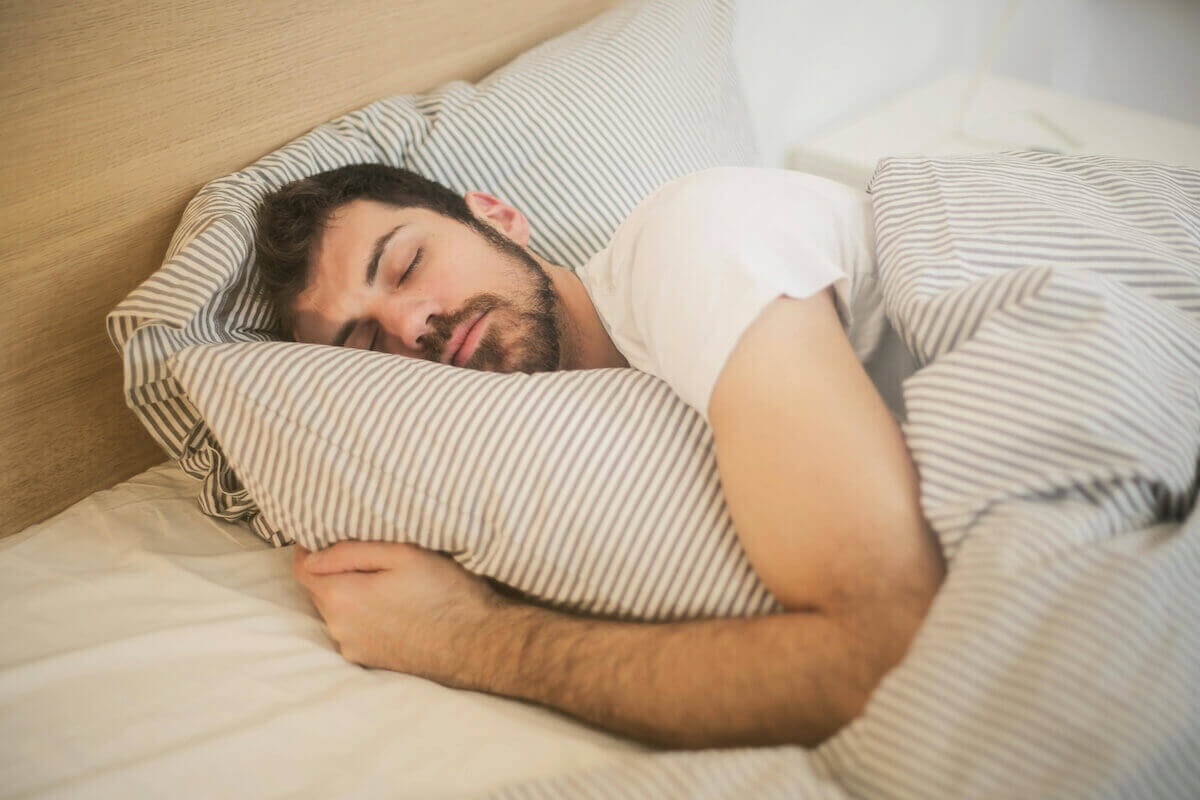Last update: March 25, 2025
7 minute read
The Importance of Sleep for Athletes
Ever wondered how sleep affects an athlete's performance and recovery? Learn the vital connection and tips for improved rest.

By Derick Rodriguez, Associate Editor
Edited by Dr. Jacquie Leone, NMD, HN

People often argue online and among fitness enthusiasts about how important sleep is for athletes, but understanding its role in performance and recovery is crucial. Before we dive in, make sure your health is on the right track by evaluating your vitamin needs here. Today, we'll cover why sound sleep is non-negotiable for athletes aiming to improve their performance and speed up their recovery.
Key takeaways
- Quality sleep is essential for muscle recovery and performance
- Strategic dietary choices and timing can improve sleep
- Supplementation, like tart cherry juice and magnesium, may enhance sleep quality
Why does sleep matter for athletes?
Sleep is the cornerstone of recovery for athletes. During sleep, the body undergoes repair and rejuvenation processes critical for muscle growth, memory formation, and hormonal balance. These elements are important for athletes looking to improve their performance and overall health.
- Stages of sleep: In particular, the deep sleep phase plays a crucial role in physical recovery, while REM sleep is essential for cognitive function.
- Effects of sleep deprivation: Lack of sleep can lead to decreased performance, longer recovery times, increased risk of injury, and compromised health.
How much sleep do athletes need?
The right amount of sleep can vary from person to person, but athletes generally require more than the average person.
- General guidelines: Most adults need 7-9 hours of sleep per night, but athletes might benefit from 9-10 hours to fully recover from intense training or competition.
Enhancing performance through sleep
Improving sleep quality can have a measurable effect on an athlete's performance, including faster reaction times, greater endurance, and improved accuracy. Outside of physical improvements, the mental clarity and improved cognition associated with better sleep quality also help improve athletic performance.
- Sleep strategies: Consistent bedtime and wake-up times, a cool and dark sleep environment, and avoiding caffeine and screens before bed can enhance sleep quality.
Health made easy: your go-to resource for essential vitamins and supplements

The role of supplements in sleep optimization
Certain supplements can help in improving sleep quality and duration, aiding in recovery and performance for athletes.
- Melatonin: Helpful in regulating sleep cycles, especially for athletes traveling across time zones.
- Magnesium: Supports deep, restorative sleep by maintaining healthy levels of GABA, a neurotransmitter that promotes sleep.
For more in-depth tips, make sure to read about creating the perfect sleep environment for a restful night.
Recovery and sleep: A closer look
Sleep is just as important as physical training for athletes. During sleep, the body repairs muscles and tissues, consolidates memories, and releases hormones that are crucial for recovery and growth.
- Restorative processes: Include muscle repair, bone growth, and strengthening the cardiovascular system.
- Hormonal balance: Sleep regulates the release of crucial hormones like growth hormone and testosterone, which are key for recovery.
VitaRx Tip
If you’re looking to improve your athletic performance, consider personalized supplement packs for best results.
Let’s continue to explore how sleep affects athletes' performance. We'll discuss easy ways to improve sleep quality and answer some common questions about sleep and athletic performance.
Actionable sleep strategies for athletes
To maximize the restorative power of sleep, athletes can adopt scientifically-backed strategies. These support improved sleep quality and also translate into better performance metrics and recovery dynamics.
Exposure to blue light from screens can disrupt the body’s natural sleep-wake cycle, making it harder to fall asleep. Limiting screen time at least an hour before bed can significantly improve sleep onset and quality. Consider reading a book or practicing relaxation techniques instead.
Creating a sleep-friendly environment is key to enhancing sleep quality. This means maintaining a cool, quiet, and dark room. Investments in a comfortable mattress and pillows tailored to your sleeping position can also support sleep quality.
Understanding the effect of diet on sleep
What an athlete eats and drinks can affect their sleep quality and, consequently, their recovery and performance. Nutritional strategies should be tailored to not only optimize physical health but also promote restorative sleep.
Eating heavy meals close to bedtime can disrupt sleep. Aim to have your last large meal 2-3 hours before sleep, giving your body enough time for digestion.
Certain foods can improve sleep quality due to their composition. For instance, foods high in magnesium, like almonds and leafy greens, can promote relaxation and enhance sleep quality.
Supplements that support sleep and recovery
Beyond dietary considerations, some supplements can help optimize sleep and speed up recovery, particularly for athletes with strict training schedules.
Tart cherry juice is known for its high levels of melatonin, which can improve sleep duration and quality. Drinking a small amount before bed may help regulate sleep patterns.
CBD oil has shown promise in reducing anxiety and improving sleep. However, athletes should exercise caution and consult a healthcare professional to ensure compliance with competition regulations.
Strategies for managing travel and sleep
Travel, especially across time zones, can affect sleep schedule and performance. Managing your sleep properly during travel is essential to avoid these effects.
Gradually adjusting your sleep schedule a few days before travel can help minimize jet lag. Exposure to natural light at your destination can also help reset your internal clock.
Bringing familiar sleep aids, like a favorite pillow or white noise machine, can make sleeping in a new environment easier and promote better sleep quality. By implementing these strategies and understanding the critical role of sleep in athletic performance and recovery, athletes can harness the full power of rest.
Quality and timing are key
Optimizing sleep isn’t just about quantity but also quality and timing relative to training schedules and competitions.
Frequently asked questions (FAQ)
Here are some of the most frequently asked questions about how important sleep is for athletes.
Final thoughts
Considering the effects of quality sleep on recovery, mental clarity, and overall performance, establishing and maintaining healthy sleep practices becomes non-negotiable for athletes at all levels. Implementing strategies for better sleep, understanding the influence of diet and supplementation, and stopping the effects of travel on sleep schedules are all steps in the right direction.
Sources and references
- Sleep and Athletic Performance: Impacts on Physical Performance, Mental Performance, Injury Risk and Recovery, and Mental Health - PMC.
- The Sleep and Recovery Practices of Athletes - PMC
- Sleep Hygiene for Optimizing Recovery in Athletes: Review and Recommendations - PMC
- The Impact of Sleep Interventions on Athletic Performance: A Systematic Review - PMC
- Effect of tart cherry juice (Prunus cerasus) on melatonin levels and enhanced sleep quality
- The effect of magnesium supplementation on primary insomnia in elderly: A double-blind placebo-controlled clinical trial.
- The influence of blue light on sleep, performance and wellbeing in young adults: A systematic review
- Effect of melatonin supplementation on sleep quality: a systematic review and meta-analysis of randomized controlled trials
- Effects of thermal environment on sleep and circadian rhythm - PMC
Editor

Derick Rodriguez
Derick Rodriguez focuses on editing health and wellness-related content. With over half a decade of experience in the digital realm, Derick has developed a unique skill set that bridges the gap between complex health concepts and accessible, user-friendly communication. His approach is deeply rooted in leveraging personal experiences and insights to illuminate the nuances of health and wellness topics, making them more approachable and empowering readers with knowledge and confidence.
Fact checker

Dr. Jacquie Leone
Dr. Leone holds a BA in Psychology, a Doctorate in Naturopathic Medicine, and board certification in holistic nutrition. In addition to practicing medicine, Dr. Leone has developed and currently teaches science and nutrition courses for a nationally accredited institution. She specializes in chronic illness, gastrointestinal dysregulation, inflammatory conditions, and mental health. Her unique approach combines the wisdom of Eastern medicine with the technology and science of Western medicine, offering an integrative approach heavily focused on functional medicine.
At VitaRx, we're not just passionate about our work — we take immense pride in it. Our dedicated team of writers diligently follows strict editorial standards, ensuring that every piece of content we publish is accurate, current, and highly valuable. We don't just strive for quality; we aim for excellence.
Related posts
While you're at it, here are some other relevant articles you might be interested in.

Get your personalized vitamin recommendations in less than
5 minutes.
Get your personalized vitamin recommendations in less than
5 minutes.




